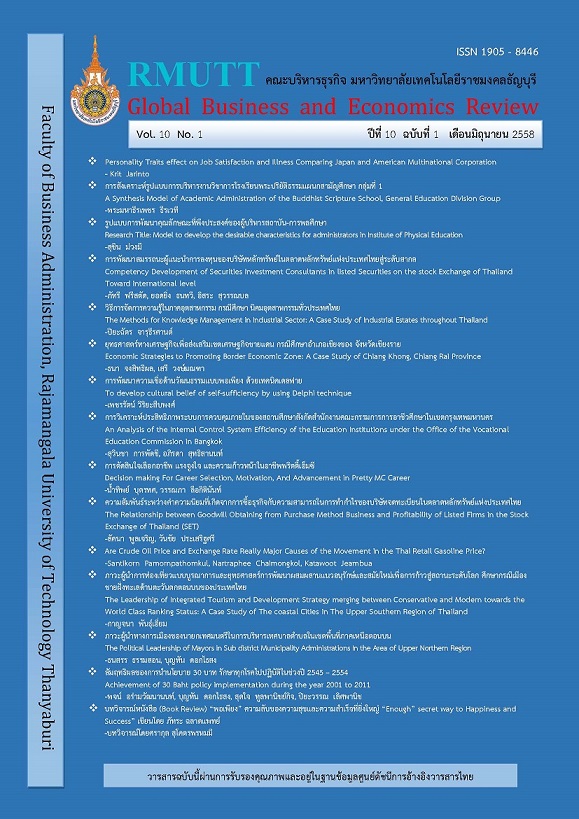A SYNTHESIS MODEL OF ACADEMIC ADMINISTRATION OF THE BUDDHIST SCRIPTURE SCHOOL, GENERAL EDUCATION DIVISION
Keywords:
Academic Administration, Buddhist Scripture School, General EducationAbstract
The purposes of this research were to (1) study the condition of the present situation and the feasibility situation of Academic Administration of the Buddhist Scripture School, General Education Division Group 1, and (2) synthesize model of academic administration of the Buddhist Scripture School, General Education Division Group 1. The sample group consisted of 15 directors and 150 teachers. The instrument used for data collecting was a questionnaire and the statistical used were means and standard deviation. The appropriate model was analyzed and criticized by the experts using a focus group for application and obtaining the most applicable model for Academic Administration of the Buddhist Scripture School, General Education Division Group 1. The results found that: The condition of the present situation of Academic Administration of the Buddhist Scripture School, General Education Division Group 1 was the formal administration model. The synthesis of data from questionnaire and interview the directors of another general education division group found that the appropriate model was mixture between the formal model and collegial model. The formal model consisted of academic program planning, development and implementation of academic work and measurement and evaluation because of regulations of Sangha Supreme Council. The collegial model consisted of curriculum administration, instructional management and educational media management because of using the co-operational between the colleagues and external organization. The appropriateness and possibility result related to 5 experts in focus group for the model of academic administration of the Buddhist Scripture School, General Education Division Group 1 was mixture between the formal model and the collegial model. Formal model assume that organizations are hierarchical systems in which managers use rational means to purpose agreed goals. Heads possess authority legitimized by their formal position within the organization and collegial model assume that organizations determine policy and make decisions through a process of discussions in leading to consensus. Power is shared among some or all members of the organization who were thought to have shared understanding about the aims of the situation
References
กองพุทธศาสนศึกษา. แผนยุทธศาสตร์และแผนปฏิบัติการการพัฒนาการศึกษาโรงเรียนพระปริยัติธรรม แผนกสามัญศึกษา พ.ศ. 2553 - พ.ศ.2562. สืบค้นจาก http://www.onab.go.th/e-Books /Strategy-saman.pdf
โกศล ศรีทอง. (2543). คุณลักษณะของผู้บริหารที่สัมพันธ์กับคุณภาพการบริหารงานวิชาการใน โรงเรียนมัธยมศึกษา สังกัดกรมสามัญศึกษา เขตการศึกษา 5. (ปริญญานิพนธ์ปริญญา มหาบัณฑิต, มหาวิทยาลัยศรีนรินทรวิโรฒ.
ธงชัย หลิมทิพย์. (2548). รายงานการประเมินโครงการพัฒนาแหล่งเรียนรู้ของโรงเรียนวัดใหม่บำรุงธรรม สำนักงานเขตพื้นที่การศึกษาสุพรรณบุรี เขต 2. สุพรรณบุรี: สำนักงานเขตพื้นที่การศึกษา สุพรรณบุรี เขต 2.
พระขรรค์ชัย ศุภนภินทรีย์. (2551). การบริหารโรงเรียนพระปริยัติธรรมแผนกสามัญศึกษาตามแนวปฏิรูป การศึกษา กลุ่มที่ 1เขตพื้นที่การศึกษากรุงเทพมหานคร เขตที่ 1. (วิทยานิพนธ์ปริญญา มหาบัณฑิต, มหาวิทยาลัยราชภัฏสวนสุนันทา).
พระเฉลิมชาติ ชาติวโร (อิทธะรงค์). (2551). ศึกษาวิเคราะห์การพัฒนาการศึกษาของคณะสงฆ์ ไทย. (วิทยานิพนธ์ปริญญามหาบัณฑิต, มหาวิทยาลัยมหาจุฬาลงกรณราชวิทยาลัย).
พระชิน นิวงษา. (2544). การใช้สื่อการเรียนการสอนของครู-อาจารย์โรงเรียนพระปริยัติธรรมแผนกสามัญศึกษา จังหวัดนครพนม. (วิทยานิพนธ์ปริญญามหาบัณฑิต, มหาวิทยาลัยมหาสารคาม).
พระมงคล มหานาโม. (2547). การบริหารหลักสูตรของโรงเรียนพระปริยัติธรรม แผนกสามัญศึกษา. (วิทยานิพนธ์ปริญญามหาบัณฑิต, มหาวิทยาลัยมหาสารคาม)
พระมหาชนแดน สมบุตร. (2550). ปัจจัยที่ส่งผลต่อประสิทธิผลการบริหารงานวิชาการโรงเรียนพระปริยัติธรรมแผนกธรรมและบาลี สำนักเรียนในกรุงเทพมหานคร. (วิทยานิพนธ์ปริญญา มหาบัณฑิต, มหาวิทยาลัยราชภัฎสวนสุนันทา).
พระมหาอภิลักษณ์ จักรแก้ว. (2553). การศึกษาการบริหารงานวิชาการโรงเรียนพระปริยัติธรรมแผนกสามัญศึกษา สังกัดสำนักงานพระพุทธศาสนาแห่งชาติ กลุ่ม 1. (ปริญญานิพนธ์ปริญญา มหาบัณฑิต, มหาวิทยาลัยศรีนครินทรวิโรฒ).
พระมหาเอกสิทธิ์ มณีสาย. (2546). การบริหารงานโรงเรียนพระปริยัติธรรม สำนักเรียนวัดพรหมวงศาราม เขตดินแดง. (วิทยานิพนธ์ปริญญามหาบัณฑิต, มหาวิทยาลัยเกริก).
พระสุทธิพร ปัญญาผาบ. (2544). การบริหารงานโรงเรียนพระปริยัติธรรมแผนกสามัญศึกษาจังหวัดลำปาง. (วิทยานิพนธ์ปริญญามหาบัณฑิต, มหาวิทยาลัยเกริก).
วัลลภ สภุิสิงห์. (2554). รูปแบบการบริหารโรงเรียนขนาดใหญ่เพื่อรองรับการกระจายอำนาจ. (วิทยานิพนธ์ ปริญญาดุษฎีบัณฑิต, มหาวิทยาลัยสยาม).
วิโรจน์ สารรัตนะ. (2545). การบริหาร หลักการ ทฤษฎี ประเด็นทางการศึกษา และบทวิเคราะห์องค์การ ทางการศึกษาไทย (พิมพ์ครั้งที่ 3). กรุงเทพฯ: ทิพย์วิสุทธิ์
สำนักงานรับรองมาตรฐานและประเมินคุณภาพการศึกษา. (2551). บทสรุปส าหรับผู้บริหาร. กรุงเทพฯ: มปพ.
เสน่ห์ เจริญศักดิ์. (2547). การดำเนินการตามมาตรฐานด้านการจัดการเรียนการสอนในโรงเรียนพระปริยัติ ธรรมแผนกสามัญศึกษา กลุ่มโรงเรียนพระปริยัติธรรม แผนกสามัญกลมุ่ 5. (สารนิพนธ์ปริญญา มหาบัณฑิต, มหาวิทยาลัยศรีนครินทรวิโรฒ).
อเนก นิมมานนิรชร. (2544). ความสัมพันธ์ระหว่างแบบผู้นำของผู้บริหารโรงเรียนกับประสิทธิผลการบริหารวิชาการในโรงเรียนมัธยมศึกษา สังกัดกรมสามัญศึกษา จังหวัดนครราชสีมา. (วิทยานิพนธ์ปริญญามหาบัณฑิต, มหาวิทยาลัยราชภัฎนครราชสีมา).
อุทัย บุญประเสริฐ. (2543). งานวิจัยเรื่องภารกิจ โครงสร้าง และอัตรากำลังของสถานศึกษาตามพระราชบัญญัติการศึกษาแห่งชาติ. กรุงเทพฯ: วี.ที.ซี. คอมมิวนิเคชั่น.
Bush, T., & Glover, D. (2004). School leadership: Concept and evidence. National college for school leadership.
Child. (1988). An introduction to school administration: Selection reading. New York: McMilan Company.
Hoy, W. K., & Miskel, C. G. (2005). Educational administration: Theory, research, and practice (7th ed.). New York: McGraw Hill.
Roberson, A. H., & Briggs, A. H. (1998). A Survey of the characterization problem in the conflict of laws. Saint Paul: West Publishing Company.
Downloads
Published
How to Cite
Issue
Section
License
The articles published in this journal are the intellectual property of their respective authors.
The views and opinions expressed in each article are solely those of the individual authors and do not reflect the positions of Rajamangala University of Technology Thanyaburi or any of its faculty members. All components and content of each article are the sole responsibility of the respective authors. In the event of any errors, the authors shall bear full responsibility for their own work.








